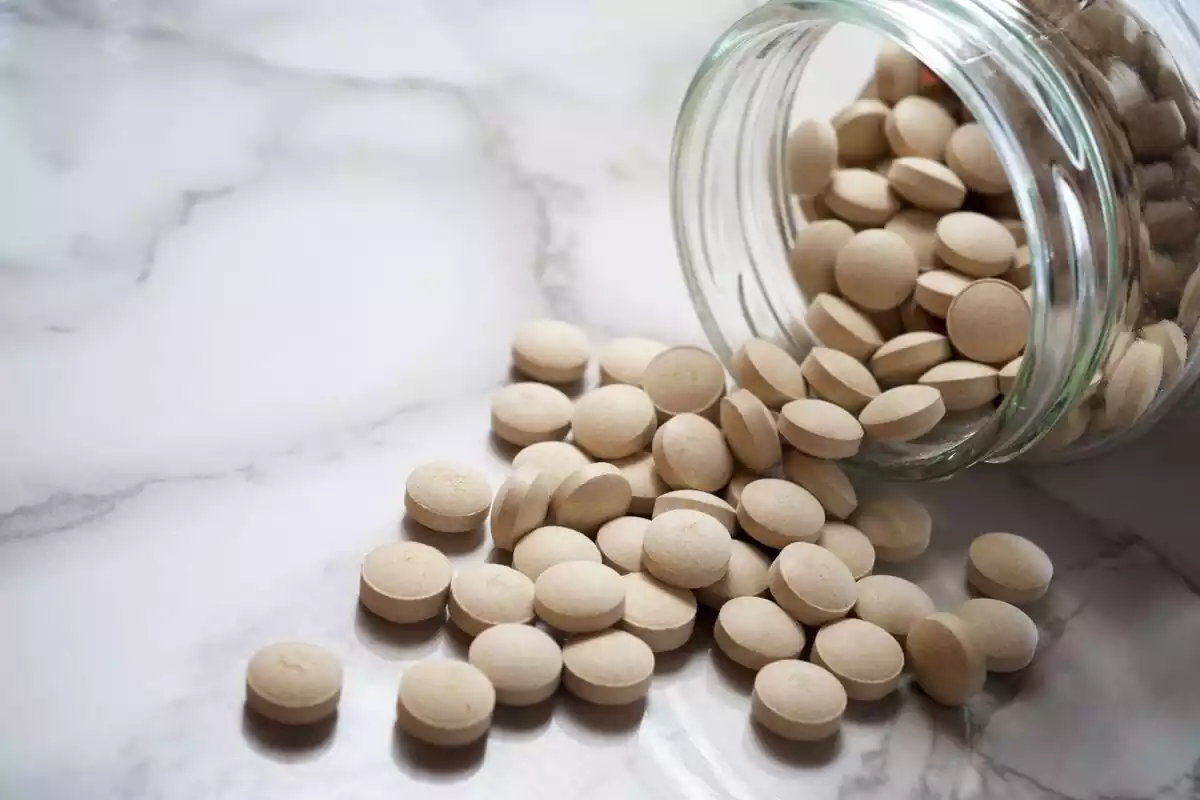Brewer's yeast has a plethora of benefits related to its nutritional value, positively affecting hair growth. Although many think that nutritional yeast is fattening, if you eat it as a part of a balanced diet as indicated, this isn't necessarily true.
Below, we take a look at what brewer's yeast is, its uses, and the nutrition of this food, as well as its primary benefits for our health.
What is brewer's yeast?
Yeast -also known as a ferment- belongs to a group of fungi able to carry out the decomposition process via the fermentation of certain organic compounds to produce specific substances, as is the case of beer.
The species, Saccharomyces cerevisiae, is one of the best-known yeasts since it is used in alcoholic fermentation and in the process to produce beer, wine, mead, etc.
More specifically, brewer's yeast is a type of ferment that's obtained from grains like barley, thanks to the previously cited microorganism.
The product obtained from this prior fermentation is dried and pasteurized before it is sold in powder, flake, or capsule form. Likewise, to get rid of its bitter flavor, some nutritional yeast undergoes an additional process.
Brewer's yeast nutrition
Brewer's yeast is sugar-free and highly nutritious, as we'll explain below. It does not contain alcohol, lactose, or gluten and you can buy it at any supermarket. It is considered a dietary supplement. As we mentioned before, this is a product high in protein -approximately 50 g per 100 g-, it also contains amino acids and other essential nutrients. These include zinc, folic acid, and almost all B complex vitamins.
Consumption
Add this product to any meal as a condiment. Remember that due to its high protein content, just one tablespoon contains about 4g of protein. It's usually added to vegan cheese recipes with nuts.
In capsules
The capsule option, taken orally, usually comes in a box of 60 pills at 400mg a piece and depending on the dosage, this usually lasts for approximately 2 weeks.
The recommended dosage is generally 2 pills daily, always taken with water and before meals to help with intestinal transit.
In flakes or powder
Besides, you can also find this substance as a powder. This last one is 125 g that lasts much longer than the capsule form.
Brewer's yeast flakes is another name for a very similar product which dissolves quickly in liquids, or that can be sprinkled onto food. Avoid taking it with water since it forms a thick paste that's hard to digest later on.
Finally, this product is readily available at grocery stores, and it usually comes in all of the forms that we mentioned before, to meet each person's needs.
5 Nutritional yeast benefits
This dietary supplement has incredible benefits for the body. To learn more about this information, we'll show you some of the benefits of brewer's yeast.
1. Promotes immune function
Thanks to the fact that it's a great source of vitamin B, nutritional yeast can turn fats, proteins, and carbohydrates into energy, protecting us from illnesses, making us stronger and putting us in a good mood, ready to take on the day ahead.
It can also help with certain health conditions like chronic fatigue syndrome (CFS) since it's rich in proteins, minerals, and vitamins; essential supplements that are appropriate for those that have this syndrome.
2. Excellent source of fiber
Besides the vitamins and minerals that it contains, this supplement is a great source of fiber that can -when combined with proper treatment- regulate constipation progressively.
3. Aids in skin regeneration
Since it contains almost all B complex vitamins -except B12- and certain minerals like zinc, this makes it rich in biotin. That's why brewer's yeast can activate cell regeneration in tissue like skin or hair.
4. Appropriate for celiacs, diabetics, and those with high blood pressure
This product doesn't contain any sugar, gluten or preservatives. It's low-sodium, and its nutritional value is appropriate to compensate for certain deficiencies that some people may have. Besides, it's linked to blood pressure regulation.
5. Benefits intestinal flora
If it's taken properly along with a healthy diet, nutritional yeast can help the body's intestinal flora. This could be affected when individuals take a lot of medications for many years, as a result of some types of chronic illnesses.

Brewer's yeast for hair growth and health
Thanks to its high vitamin content, brewer's yeast is known to benefit the health and beauty of hair. For the most part, it helps to strengthen the roots and promote growth, fighting hair loss. This product is perfect for all of those times when your hair is weaker than usual.
To get this type of benefit from nutritional yeast, try taking it as a dietary supplement -pills or powder- or using it externally with a natural hair mask that you can make at home. If you want to make the homemade version, follow the steps below.
Nutritional yeast hair mask
To make this mask, you just need the following ingredients, listed below:
5 Tablespoons of brewer's yeast flakes or powder
1 Tablespoon of olive oil
A little bit of water.
Just mix these ingredients in a bowl. First add the nutritional yeast, olive oil, and then the water. With the last ingredient, you'll have to add it slowly until you achieve a smooth paste.
Once you have your mask ready, apply it to your dry hair and then put on a shower cap. Let the product act for 1 hour and then rinse your hair with lukewarm water, and then wash it the way you usually would.
References
Moslehi-Jenabian, S., Pedersen, L. L., & Jespersen, L. (2010). Beneficial effects of probiotic and foodborne yeasts on human health. Nutrients, 2(4): 449-73.
Rambla, M. A. O., & Balbín, A. J. C. (2007). Procesamiento de levadura para la obtención de derivados. Diferentes alternativas. ICIDCA. Sobre los Derivados de la Caña de Azúcar, 41(1): 2-11.
